Liars: "I took a bag of percussion instruments and tipped them on the floor, and Angus told me to do it again because he wanted to record it"
Dissolving the contours of rock and electronics, Liars’ released their 10th album this August. We charted the making of the record with Angus Andrew and Laurence Pike
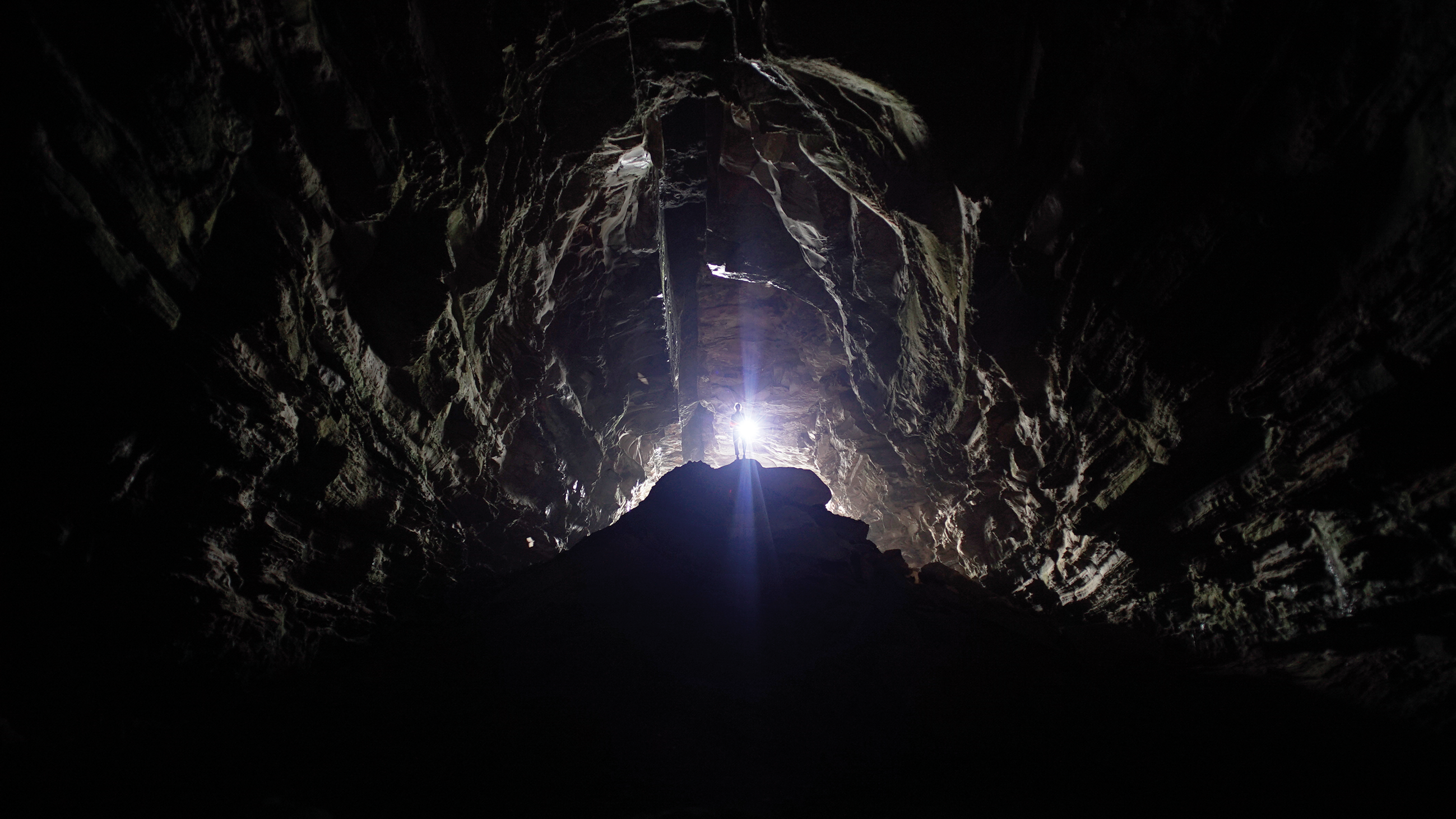
Want all the hottest music and gear news, reviews, deals, features and more, direct to your inbox? Sign up here.
You are now subscribed
Your newsletter sign-up was successful
As founding member of Australian-American rock band Liars, Angus Andrew has constantly sought progression through experimentation.
With four members having previously departed the group, recent albums TFCF (2017) and Titled with the Word Fountain (2018) were recorded and produced entirely by Andrew. However, for Liars’ 10th album, The Apple Drop, the producer/songwriter invited former live players Cameron Deyell and Laurence Pike into the fold.
Given complete freedom to experiment, Andrew focused their attention on live improvisation, directing his new band members down manifold avenues of exploration. Despite the pandemic forcing the trio to abandon progress, Andrew had enough material to complete the album, warping Deyell and Pike’s raw instrumentation with his own selection of probability-based algorithmic tools.
Angus, with the last two Liars albums being solo efforts, was it always the intention to bring other musicians back into the fold for your 10th album?
AA: “After playing with Laurence and Cameron during the Australian leg of our last few tours I’d gotten a taste of what it would be like to stand in a room with these two musicians and began to imagine the possibilities of us working together.
"I was already a big fan of Laurence’s solo work and knew Cameron was an amazing musician outright, so the idea of being able to connect with their incredible skills made me excited to be in an acoustic space again. Most of the previous records were made in the computer, but I wanted The Apple Drop to have a different sonic architecture.”
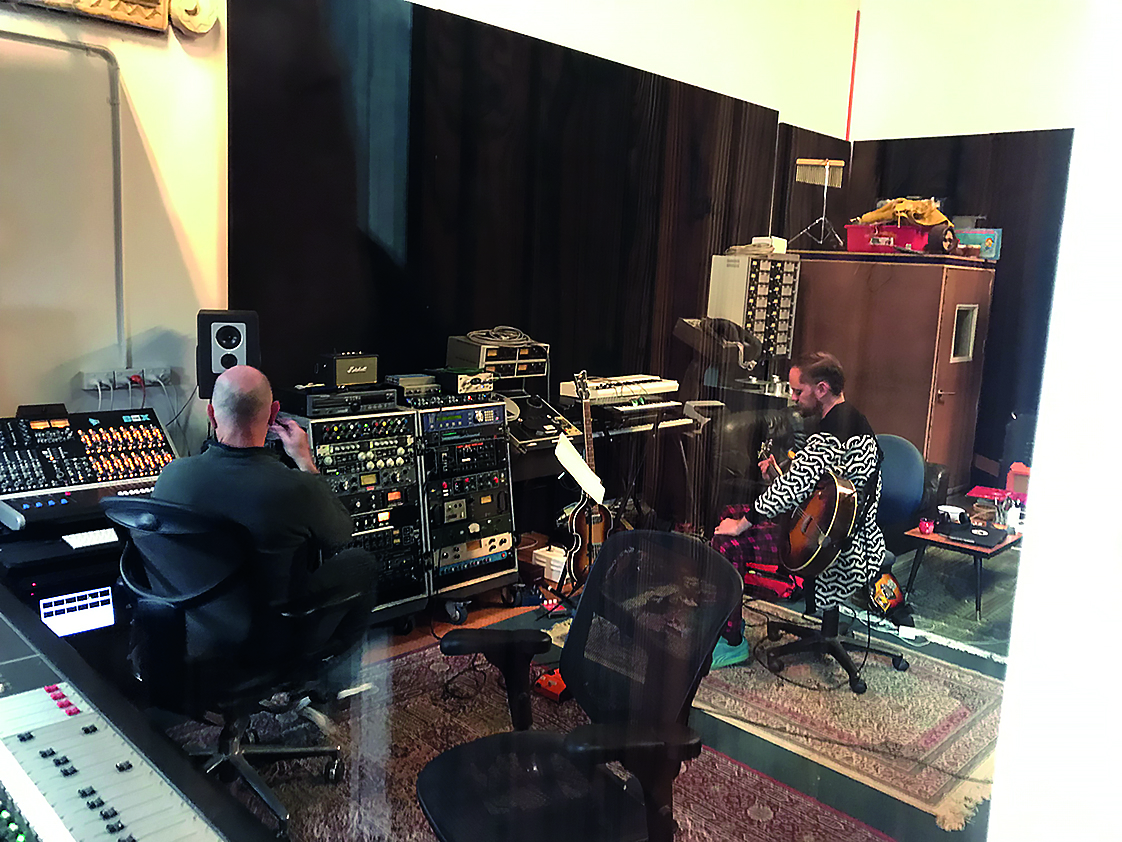
Laurence, at what point did you become involved in the band?
Want all the hottest music and gear news, reviews, deals, features and more, direct to your inbox? Sign up here.
LP: “It was late 2018 that we first did some shows together. I’d already been a fan of Liars since some of their earliest releases, so they’ve been an integral part of my musical journey. Obviously, being aware of the band’s legacy and what that entails, it was exciting to be involved – initially to tour and then in the studio, but it all felt very natural.”
I literally took a bag of percussion instruments and tipped them on the floor and Angus told me to do it again because he wanted to record it
Did you feel a sense of serendipity?
LP: “When I knew that Angus had come back to Australia I had a strange sense that our paths would cross at some point and we’d become kindred spirits, and that became obvious as soon as we started playing together because everything just clicked.
"Angus approaches every album with a sense of childlike exploration and that’s very much part of my way of making music too. Daresay I’ve been influenced by his work, so it would be great if this record is the first step in a long process.”
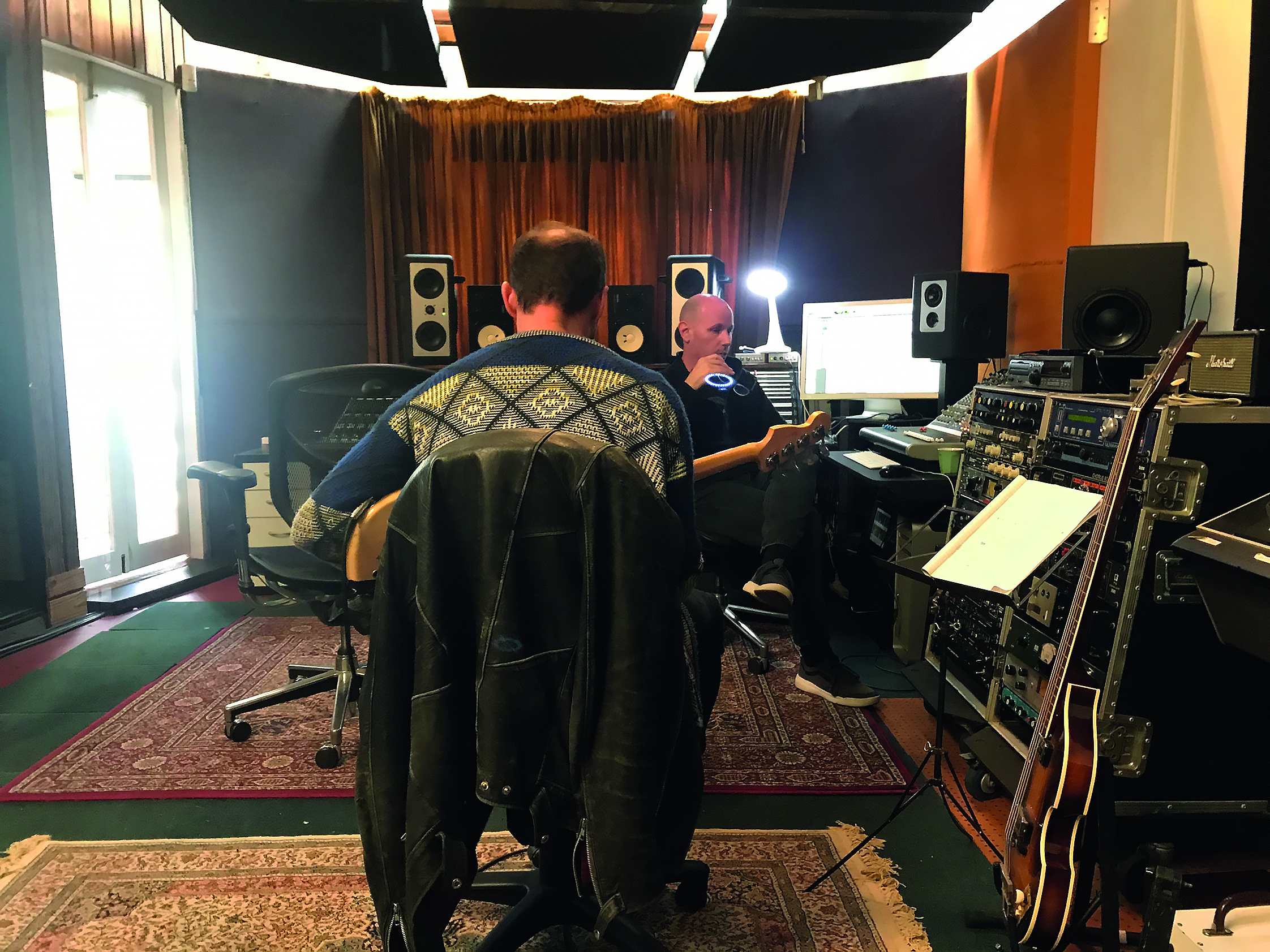
Did you immediately have ideas about how you could contribute?
LP: “There was an element of that, but the main thing was that I didn’t want to fuck it up [laughs]. The beautiful thing is that Angus has an incredibly open and welcoming way of working – at no point did I feel I was secondary to the process, and that made things super-easy.”
In the midst of the pandemic, how did the collaboration unfold?
AA: “Initially, we were working in all sorts of directions and trying to come up with different angles, but beyond Cameron and Laurence’s instrument-playing they have a sense of awareness when it comes to audio quality and brought a lot to that. We spent time together in the studio but were ultimately separated because of lockdown for a long period.
"For me, a lot of the songwriting process has to do with editing and affecting sound so that I can figure out where things are going to sit. Sorting through all of their ideas and weaving those parts together was only something I could do thanks to their huge influence.”
We ended up using a few of his zithers and harps that he’d brought back from India [...] there was also a boat propeller lying on the floor that we ended up whacking
LP: “Getting a good drum sound was the first stop for those initial sessions, then after shutdown Cameron and I were recording overdubs at home and sending files back and forth. When we were in the studio sessions together it was about feeling things through and trying to find a thread.
"That became more obvious once we’d started to finesse things, but so much of that has to do with Angus’s wonderful way of reframing things when left to his own devices. What was equally exciting for me was being able to feed ideas to him without knowing how they might come back.”
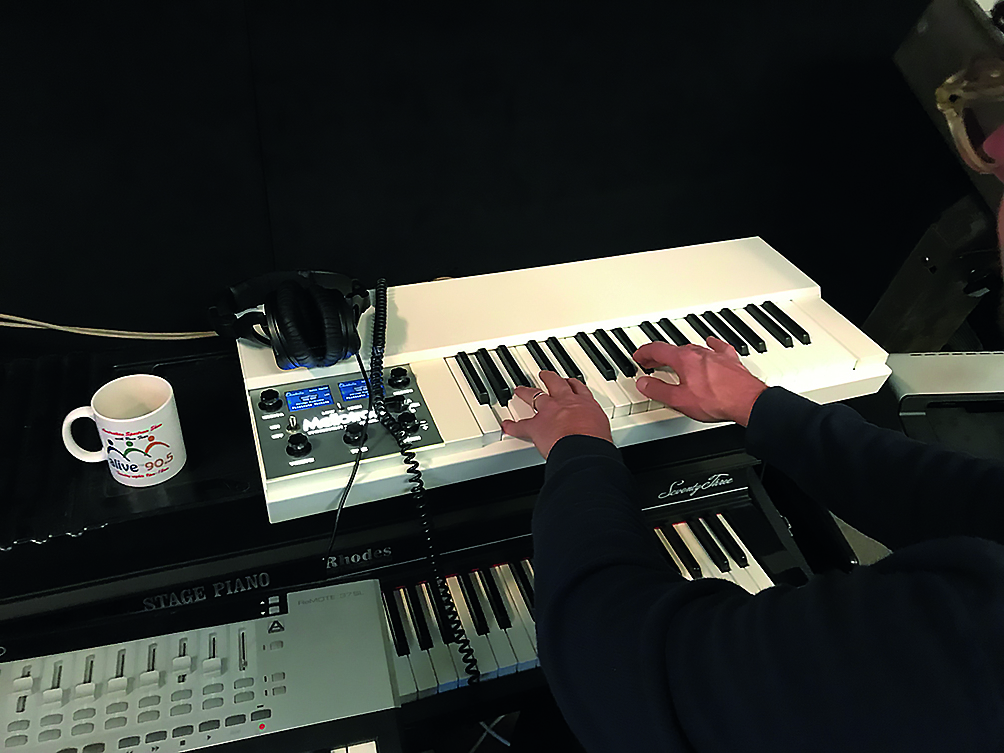
Where did you start pinning those ideas down?
LP: “We went to Oceanic Studios in the northern beaches of Sydney, which looks a bit ramshackle but has a really beautiful-sounding room with great equipment. It’s owned by Jim Moginie – the guitar player and one of the principle songwriters for Midnight Oil.
"He’s an amazing guy and I’ve done a lot of recording up there because it’s one of the best-sounding drum rooms in Sydney, if not Australia. It’s a weird place because it’s built into an industrial lock with guys hotting up motorcycles in the unit next door and people working on fibre glass boats, so the smell of acrylic is often wafting into the studio.
"It’s got a vibe and a bit of magic about it, which is increasingly hard to find with so many studios closing down in Australia.”
Did you bring in your own gear or were you able to make something out of whatever the studio happened to have available?
LP: “I’ve amassed a collection of drum gear and bits and pieces and Cameron had a bunch of weird instruments too. We ended up using a few of his zithers and harps that he’d brought back from India after living there for a couple of years.
"We also used a couple of old pianos in the studio for the track Star Search. I’m not sure I’d ever heard piano on a Liars record, so that felt like a new colour in the spectrum.
When you’re writing a song the hardest thing is to use the word ‘I’
There was also a boat propeller lying on the floor that we ended up whacking at some point.”
AA: “In those sessions I didn’t put my hand on an instrument and was just trying to get these guys to do as many different things as I could within that short space of time and capture where that could lead us. The boat propeller was another part of that, but I was also looking for moments where things didn’t go quite right.”
LP: “There was a moment where I literally took a bag of percussion instruments and tipped them on the floor and Angus told me to do it again because he wanted to record it.
"I’m also used to accumulating samples or elements that are arrhythmic or unmusical for my own music, which could be a drum stool squeaking or anything that has character to it. Having an awareness of the moment at all times is a different way of thinking about sound and I think that character carries through on all the Liars records.”
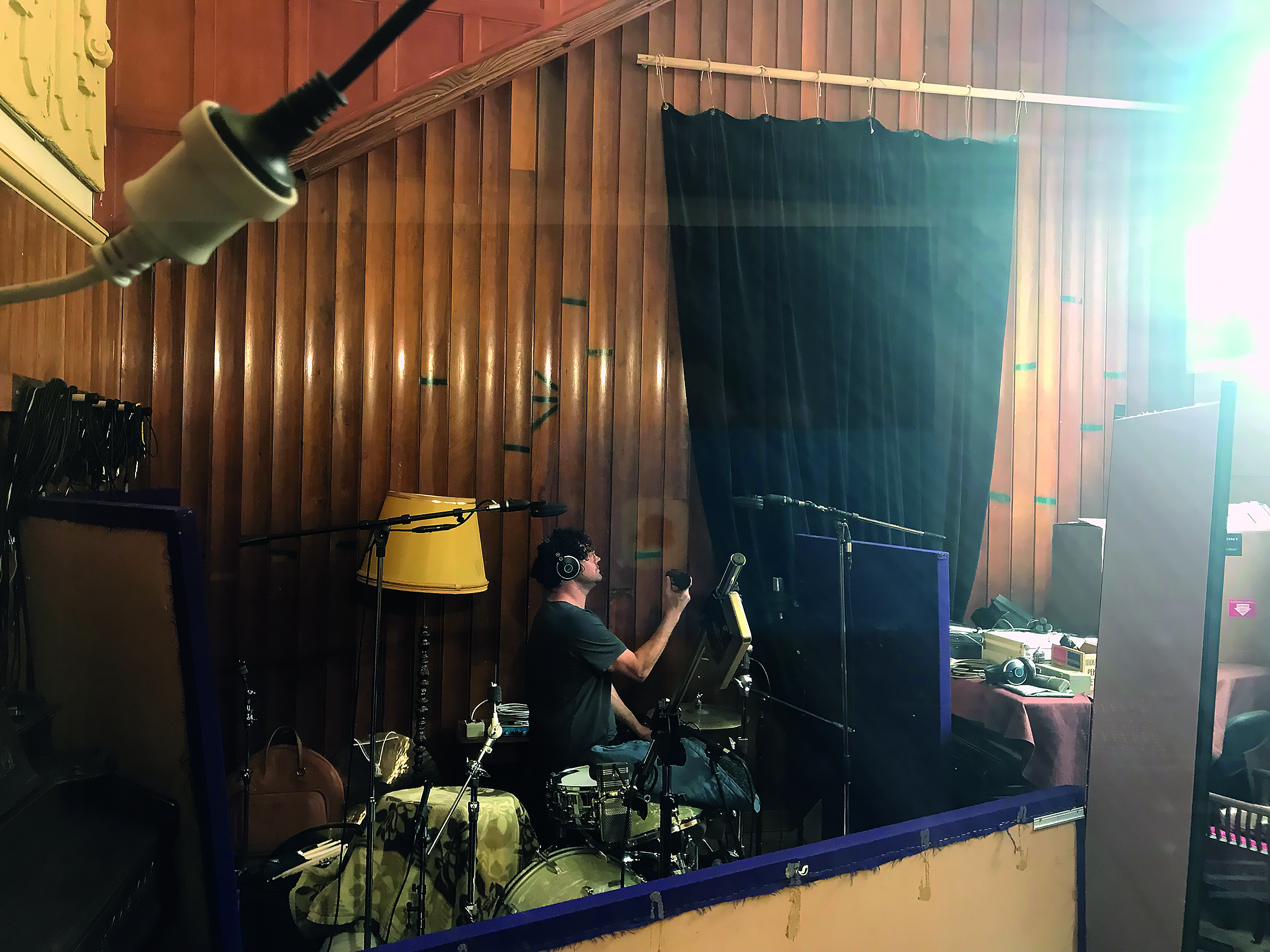
Did you have any sort of demo available to act as a rough guide?
AA: “When I was writing the demos I knew that they needed to be developed in a musical way that I didn’t feel I had the ability to do, so I was looking for the guys to help me move the songs to another place.
"The studio was part A and I needed the songs to develop an arc that went to part D, and then Q. For example, I’d just send Laurence a repeating sound and he’d respond with his drumming and Cameron might respond with another instrument and things would naturally develop that way.”
I don’t think of myself as just a drummer – drums are just a vehicle for me to make music
Was the sci-fi concept behind The Apple Drop a result of those early sessions or did that all come later following your audio manipulation of the music?
AA: “I was toying with the idea of heading out into space, which seemed ridiculous but Laurence and Cameron thought it was a good idea. Halfway through the record I started collaborating with a friend of Laurence’s who was brought in to work on the art and video direction, and that influenced the concept further. Lyrics were rewritten as we started to imagine the record visually. Then we tried to keep to a narrative arc, rather like a screenplay.”
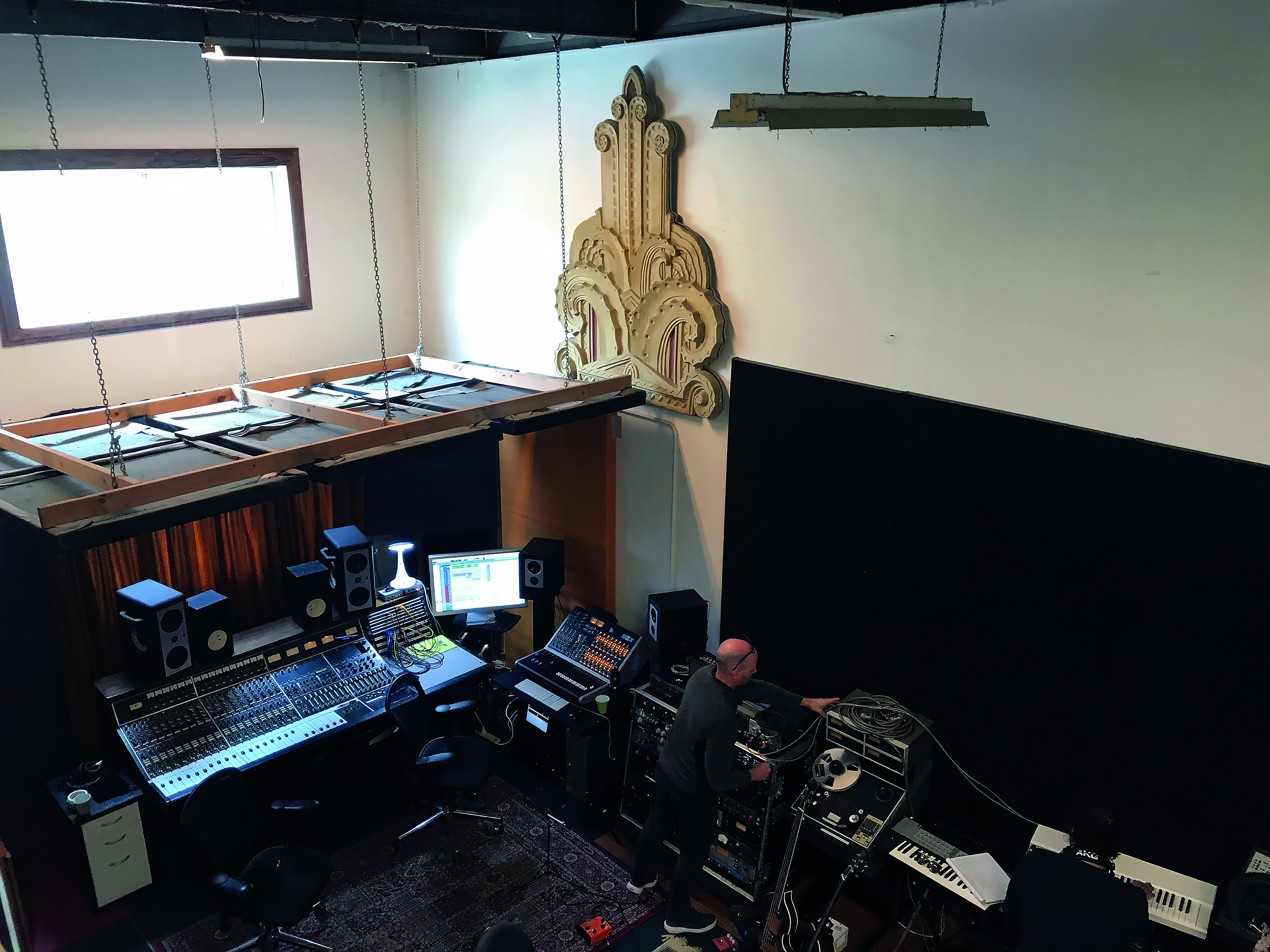
The track Sekwar shows that very effectively. It has a great video but is also very visual-sounding and triggers a lot of mental images…
AA: “That’s great to hear. It was the song that we were searching to visually explain first. We endeavoured [to go] into this cave to shoot the video and designing the album cover was part of that whole feedback loop.
"Making the video was brutal. We had a crew of super troopers enduring what was a really intense shoot because the location was not an easy place to get to and we needed to get a lot of gear there. The fun part was getting into the character of the role – performance has always been a big part of making Liars’ music.”
Despite all of the talent that you can have in a room, it still seems to me that the computer is ultimately always the most powerful thing in there
LP: “It’s funny because Cameron and I used to hang out in that cave when we were 16. It’s in the Northern beaches off the headland of North Avalon, quite close to where they shoot Home and Away; so there’s a reference point for you [laughs].”
Angus, like many artists you like to create characters. Do you feel like you’re expressing yourself vicariously through those?
AA: “When you’re writing a song the hardest thing is to use the word ‘I’. It’s so frightening to expose yourself in that way, so my tactic from the beginning was to never say ‘I’ and instead say ‘we’ or adopt some sort of character that would deflect attention away from me.
"From that perspective it’s interesting to revisit characters and utilise them again and again. As an artist, one of the best things to come out of the whole deal is that you end up with these creations that you can return to if you’re brave enough.
"They help me understand the journey that I’ve come along and also offer me an opportunity to say things that I wouldn’t normally say.”
As with the previous Liars album Drums Not Dead, we understand you wanted drum sounds to be quite prominent on this record?
AA: “For me, the key to a song has always been the drums because they have a primal aspect that I connect to on a very basic level. When you’re in the studio the drum sound is the key thing to capture because it can’t be recreated. I’ve always enjoyed working with people and try to segregate that division of who a drummer or a guitar player is.
"From that perspective, Laurence has done an amazing amount of work on this record that isn’t percussive. His use of the Mellotron, for example, was a huge step to establishing the record because that developed into the first song and helped shape how things went from there.”
I’m a creative person who’s always struggling to get my ideas out, so I’m all for whatever helps me to accomplish that
LP: “The Mellotron happened to be in the studio, but it wasn’t an original, it was one of the newer digital ones. I don’t think of myself as just a drummer – drums are just a vehicle for me to make music.
"I’m happy to throw my hand at anything, so it was nice to play some synths and do a bunch of backing vocals and we had fun experimenting. I always felt I was doing too much, but Angus was always urging me to do more. His attitude was, don’t edit too much, send me everything.”
When lockdown hit, did that change the trajectory of what you wanted to achieve?
AA: “We weren’t in a rush with the work we’d created in the studio and I was also working on another project. When lockdown fully hit it felt like the perfect time because there were no distractions and I could just dive into whatever came out of the hard drives. Laurence has a home studio setup too, so he could re-record drum parts at a high level, which was a huge win.”
The drums on Sekwar are very off-kilter, which has always been a feature of Liars’ sound…
AA: “Things that make you feel uncomfortable are good and Laurence’s playing in that song was integral to how it developed. The whole mid-section came from him chopping things up. I thought it sounded like Björk.”
LP: “I remember Angus saying that to me and was stoked. The drum part on Sekwar was a result of me trying to take a particular angle and spending a whole day trying to get this pattern down.
"Out of frustration I started to aggressively chop it up and it suddenly turned into this whole other thing. Angus gives you a sense of freedom to always follow your nose, so it turned into something far more unexpected that ended up being on the track.”
I like using Native Instruments software, particularly Reaktor. There’s endless plugins and elements that are interesting when it comes to transforming sounds
Angus, can you explain your use of algorithmic software to modify the songs?
AA: “I like using Native Instruments software, particularly Reaktor. There’s endless plugins and elements that are interesting when it comes to transforming sounds and I’m a real fan of Reaktor’s user library, which is made up of instruments and synths that people have created and uploaded. I find interesting things in there to experiment with or throw a sound into and like to hear it bounce back.”
The word ‘algorithm’ gives people the idea that the computer is taking over. Do you still see it as a tool or are you happy for computers to take over some of your processes?
AA: “Despite all of the talent that you can have in a room, it still seems to me that the computer is ultimately always the most powerful thing in there. I find what it can do to sounds and the possibilities it holds so exciting in terms of the unknown places it can lead me. In terms of artificial intelligence, I’m a creative person who’s always struggling to get my ideas out, so I’m all for whatever helps me to accomplish that.”
Any plans to play this album live in the future?
AA: “There’s no chance for us to play in Australia right now and any prospect of playing overseas is also impossible because of the difficulties of getting in and out of the country. We’re really out of luck until something major changes and hopefully that’ll happen by next year.”
In the meantime, you may as well start working on the next album…
AA: “I’ve already sent stuff to Laurence, but he said ‘you’ve sent me too much!’.”
LP: “I’m just working my way through that, throwing paint at the wall to see what happens.”


Future Music is the number one magazine for today's producers. Packed with technique and technology we'll help you make great new music. All-access artist interviews, in-depth gear reviews, essential production tutorials and much more. Every marvellous monthly edition features reliable reviews of the latest and greatest hardware and software technology and techniques, unparalleled advice, in-depth interviews, sensational free samples and so much more to improve the experience and outcome of your music-making.
